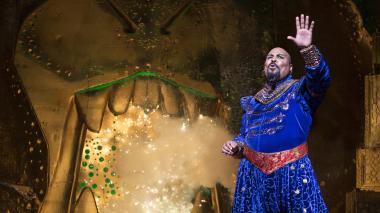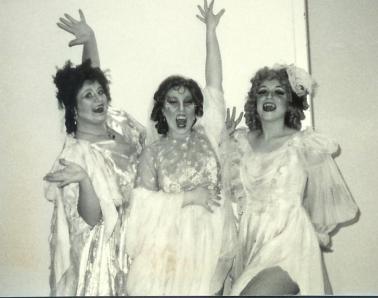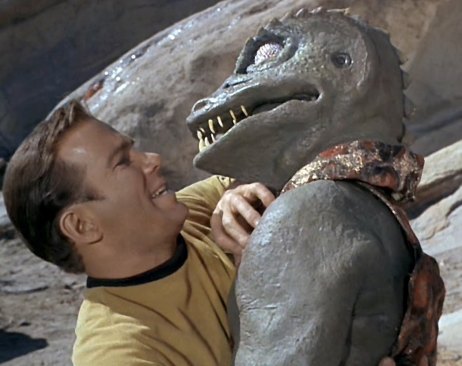
Tony winner and all-around excellent human James Iglehart as the Genie in Disney’s Aladdin. Photo by Cilla von Tiedemann.
Before anyone starts calling me out, Yes, I did watch part of the Tonys for the first time this year. My husband and I went to undergrad with James Iglehart, who may actually be the sweetest man in the world (or a strong contender), and we watched his number and his acceptance speech. It was a moment of pure joy, especially when he thanked Celestine Ranney-Howes, one of our lecturers. It’s always wonderful to see someone you know deserves recognition get it, doubly wonderful to see them thank a teacher, and triply wonderful to see a teacher you KNOW is fantastic get thanked. He sent my husband a beautiful note thanking him as well. It was lovely all around.
But I don’t watch the Tonys.
I don’t care about the Tonys and people give me a surprising amount of shit for it.
Broadway is, for the most part, commercial theatre that exists as a business enterprise to return profits to investors, and, as such, is entirely risk-averse. That’s not even remotely controversial– we all know Broadway is big business where some of the biggest players (like Disney) have set up shop. That doesn’t mean Broadway is “bad,” but it does create some specific outcomes. Broadway has massively high production values with incredible technical innovation, but shies away from anything even a little risky. Broadway is the Harlem Globetrotters of theatre– flashy, fun, technically marvelous, an amazing spectacle, an ambassador for the art, but not where the meat of the American Theatre lies. The risk is too high to do any kind of experimentation apart from tech, so the choices must be safe, tried-and-true. When the risk is 10 million dollars (or more), you’re going to choose a revival starring Hollywood celebrities or a splashy, safe musical almost every time because you have a reasonable assurance they’ll sell tickets and merch by the wagonload. You’re going to take on a new show only when it’s already proven to be a smash hit elsewhere. There are currently 45 Broadway productions with tickets on sale. 70% are musicals, and 42% feature a Hollywood star– and I didn’t count Broadway stars like Kristin Chenoweth and Sutton Foster. If I had, the count would have gone up to 50%. This is the model for Broadway today. It wasn’t always. But it is now.

While Walter Lee’s exact age isn’t given, his sister, Beneatha, is 20 and a college student. Denzel Washington’s daughters are 27 and 23. For producers, his star status overrides the fact that he is far too old for the character. His characterization is far less important than his ability to sell tickets. LaTanya Richardson Jackson, who plays Walter Lee’s mother, Lena, is just five years older than Denzel Washington.
Broadway is a tiny percentage of the theatre that happens in this country, yet we talk about it as if it’s the most important theatre in the country– or the ONLY theatre in the country. I can’t tell you how many times I’ve seen an article about “theatre” only to find that it’s just about Broadway, ignoring 99% of American theatre. Audience trends that apply to an industry where ticket prices are $200 each are not applicable to, for example, the thousands of indie theatres across the nation charging $20 a ticket, where the supposedly non-existent under-40 audience is thriving, or gospel musicals, where the supposedly non-existent African American audience is thriving. I run one of those indie theatres, and my theatre would have to close its doors were it not for the under-40 audience I’m told repeatedly do not exist.

One of my favorite moments in the entire history of my theatre company. This group of high school students brought spoons to Titus Andronicus, and held them up when the pie came out. I snagged them for this picture after the show.
Whenever I talk about the issue of overvaluing Broadway (and the attendant undervaluing of everything else), I get inundated with OUTRAGE!!11! I think, first and foremost, a lot of people grow up with Broadway as their Big Dream, and, as it’s inextricably tied to their personal dreams and identities, they can’t bear to see it discussed as anything other than the Holy Pinnacle of Theatrical Achievement. But what it really is (let’s be honest) is the Pinnacle of Theatrical Employment, which is a very different thing. It’s truly fantastic that there’s a theatre industry that employs so many people. I’m 100% behind that. But let’s not go off the rails and confuse money with quality. Money imparts a certain kind of quality– the kind that comes with technical achievement and jaw-droppingly gorgeous spectacle– but no amount of money can purchase genius, emotional impact, or transformative experience. They’re not mutually exclusive, but neither are they mutually dependent. Money does not automatically equal quality, nor does it automatically eliminate it. Let’s not go off the rails in the other direction and get pissy about corporate theatre. But money is a completely separate consideration from quality. To equate the most money with the highest quality and the most importance dosn’t make sense. Although Amy Herzog is one of the most produced playwrights in the country, she’s never been produced on Broadway. The legendary Maria Irene Fornes has never been produced on Broadway. Likewise Lynn Nottage, Ping Chong, Tarell McCraney. Paula Vogel has never been produced on Broadway.
Another point of outrage I’ve encountered about my opinion that Broadway is not the Mothership of All American Theatre is that many people hold Broadway up as one of the most important ways kids get interested in theatre, creating the theatremakers of the future. I deeply question this. First of all, sure, it gets the kids whose parents can afford to drop $600 on tickets for ONE SHOW for the family. And those kids are going to be the actors whose families can support them for several years after they graduate with their MFAs 67K in debt and can only find work at tiny indie theatres paying just enough to cover transportation– if they’re lucky. We know that far too many theatremakers are drawn from those relatively privileged classes, and more open accessibility for people not from the middle and upper classes is a conversation we’ve just begun as a community. But for now, most of Broadway is a closed ecosystem for the privileged. It’s expensive to get there, it’s expensive to stay there, and it’s expensive to see the shows. Sure, there are ways to game it to make it less expensive, but you have to be really driven to find those, and the people we’re talking about here are the NOT driven– the ones who aren’t theatre families, whose kids are potentially about to be awakened for the first time to the magic of live theatre and the possibility of making that magic central to their lives.

Sarah Ford, Lisa Kass, and me in our college production of Dracula: A Musical Nightmare. I ran around taking pictures in black and white because ART. I can’t remember who I asked to take this one.
Most kids– like me– got into theatre because there were theatre programs at school. There are plenty of kids falling in love with theatre because of a lively theatre program, or a great teacher, or a local youth show that came to their school– many, many more than there are who’ve seen a Broadway show, even on tour. So while I’m not denying Broadway’s ability to excite people, especially kids who are suckers for spectacle, I don’t think it’s anywhere near the primary place this happens. Again: This is one tiny geographical area most people will never step foot in. If you see Broadway as the center of the theatrical universe and the reason you started in theatre: great. I support that. And I could really do without the shock that I do not.
Broadway’s relationship to the rest of the theatre in this country is complicated. We make what they need. We create the playwrights, actors, designers, and techs that they need to survive. They won’t touch a play or an artist unless that play or person has been field tested extensively by the rest of us. They repackage what we make, pump a shitload of money into it, put it in a beautiful dress, and then charge us all a week’s salary to see it. But they take a tiny percentage of us and allow us to make a (often temporary, but still) living at what we do, an elusive dream for most of us. They make it possible for theatremakers to create and play in beautiful, beautiful worlds. They’re theatre ambassadors for a certain segment of the population, and that segment of the population are the same demographic from which donors and subscribers come, and boy do we need those. Their technical innovations are undeniably marvelous. Their corporate backers’ influence that creates so much aggressively inoffensive material and reliance on Hollywood stars is maddening. Their over-reliance on revivals and lack of interest in plays by women and people of color are maddening. Their nonstop repackaging of Hollywood films as slick, bland musicals is maddening. The fact that people go to see these slick, bland musicals and think “this is theatre” is maddening. But everyone connected to that slick, bland musical is EMPLOYED. The tech is spectacular. A sizable percentage of the people in that audience are thinking, “This is theatre AND I LOVE IT.” And the amount of press and public attention these shows get do continue to keep theatre’s existence on the radar. Like any longterm relationship . . . it’s complicated.
The Tonys are an awards show that celebrates the achievements of this one little corner of the world, a tiny percentage of the national theatre community. Most people in the national theatre community have not seen those shows. Most people in the national theatre community are so completely removed from what happens on Broadway that it could fall into the Atlantic and, without any connection to the internet, they wouldn’t find out for months, if ever.
That’s not to say that I begrudge your enjoyment of the Tonys, or of Broadway, or even of a Disney musical. I’m a human. Humans like spectacle. I get it. I actually love Disney. I was married in Disneyland (not even joking). I would happily watch a Disney musical or a star-studded revival of an old chestnut if I didn’t have to blow my entire month’s grocery budget on it. But this insistence that Broadway should be the center of my universe as a theatremaker– of all our universes as theatremakers– is nonsense. This insistence that what happens on Broadway happens to “Theatre”– that Broadway and the American Theatre are equivalent– is now laughably untrue. THERE’S NO SUCH THING AS “AMERICAN THEATRE.” We have many theatres, divided by class, with small indie theatres at the bottom and Broadway at the top– divided by one thing and one thing only: Money. I’ve seen great theatre in tiny houses and I’ve seen great theatre in big houses. We need to stop pretending that those with the most money are the ones producing the most important work.
And that’s why I don’t watch the Tonys unless I know someone nominated. A local awards show, not in my market, has nothing to do with me, and to pretend it does, and express shock at my lack of interest, is nuts. I don’t mind that you take an interest. I don’t mind that you care who wins an award at a regional award show not in your region. Live it up! Have your parties! Post your statuses celebrating the awardees you love and vilifying the awardees you hate! Complain away about the show itself! I support you 100% and will make cupcakes for your party. I will help you with your Antoinette Perry cosplay.
But likewise allow me my opinion that the Tonys are no more important to me and my work than the Jeffs, Oscars, or VMAs. I have a passing curiosity, and it’s always wonderful to see a worthy friend, colleague, or former student recognized, but it’s not directly applicable to my work.
So let’s hug it out, Tony lovers and Broadway worshippers. There’s room for all of us.




